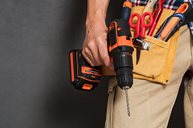Can I Claim Tax Deduction on Personal Protective Equipment?
You may be able to claim a deduction for items that protect you from the risk of illness or injury while working or that protect your
In order to be able to claim a deduction for protective items, equipment or products, you must have spent the money yourself (it can’t have been reimbursed by your employer) and you must have a record of the expense, such as a receipt or invoice.
To claim a deduction, you must need to use the items in direct connection to earning your employment income. This means you are exposed to the risk of illness or injury in the course of carrying out your work duties and that risk is not remote or negligible.
Personal Protective Equipment (PPE) includes items such as:
- hard hats and helmets
- safety glasses or goggles
- safety boots
- overalls and protective aprons
- hi vis clothing
- earplugs
- gloves
- face masks or face shields
- sanitiser
- anti-bacterial spray
- sun protection
- wet weather gear
The PPE you can claim as a deduction will depend on the nature of your employment duties.
Sunscreen and Sunhats
You can claim a deduction for the cost of sunscreen, sunhats and sunglasses (included prescription sunglasses) if your work exposes you to the effects of the sun because you are required to perform your duties for prolonged periods outdoors.
Similarly, if you are required to work for prolonged periods in the rain, you can claim a deduction for the cost of wet weather gear purchased to protect you from the real risk of illness from your work environment.
You need to apportion your expenses for these items if you use them for work and private purposes.
Personal Protective Equipment - job requires close human contact
The COVID-19 outbreak has placed greater focus on the importance of PPE for frontline health workers and anyone working in a job that requires close human contact, and all occupation specific clothing or equipment required for these roles is eligible as tax deductions.
This includes:
- Disposable or reusable gloves
- Disposable or reusable face masks
- Antibacterial spray
- Hand sanitiser
- Plastic face shields
You can claim a deduction for the cost of buying a face mask to wear at work if you need to wear a mask because you duties bring you in close contact with clients and you are not provided with masks by your employer.
To claim a deduction for other items of PPE such as gloves, sanitiser or anti-bacterial spray, your specific work duties must either:
- require you to have physical contact or be in close proximity to clients or customers while carrying out your duties
- involve you cleaning a premises.
This will usually be people working in the following industries:
- medical industry (such as doctors, nurses, dentists and allied health workers)
- cleaning industry
- airline industry
- hairdressing and beautician industry
- retail, café and restaurant industry.
If you work in these industries or occupations, the risk is not remote or negligible.
If your private use of the item is no more than incidental to your protection from the risks you are exposed to while carrying out your work duties, you don't have to apportion the expense. However, if your private use is more than incidental, you can only claim a deduction for the portion of the expense that relates to your work-related use.
Protective Clothing and Glasses
You can claim a deduction for protective clothing and safety glasses (including prescription safety glasses) that directly provide protection from the real and likely risk of illness or injury at work.
Who can claim for clothing, laundry and dry cleaning services in general?
Anyone who works in a job that requires occupation-specific clothing, protective clothing or a distinctive uniform is allowed to claim a deduction for any amount they personally spend on the purchase and cleaning of these items., If you receive an allowance for clothing from your employer, you need to include this in your tax return as income.
It's important to note that different occupations are eligible for different items, so it's a good idea to explore possible deductions specific to your industry and to speak to a tax professional if you have any questions. Some examples include:
- Protective clothing, non-slip shoes or a compulsory uniform for nurses
- Service uniform, camouflage clothing or anti-glare sunglasses for military personnel
- Protective clothing and footwear, and compulsory uniform items for firefighters
- Clothing with a company logo on it or protective footwear for fitness trainers
For laundry costs, if the amount you're claiming is over $150 (and your overall work expenses are over $300) you will need to keep written documentation to support your claim. If your laundry expenses are $150 or less, you can claim the amount you spend on laundry without providing written evidence of your laundry expenses.
But it's important to remember that you can't claim any expenses incurred for non-compulsory work uniforms unless your employer has registered the design with AusIndustry.
This means you can't claim for:
- The cost of purchasing or cleaning a plain uniform
- The cost of purchasing or cleaning ordinary clothes you wear for work that may also protect you (such as normal, closed-in shoes)
- The cost of purchasing or cleaning clothes you bought to wear for work that are not specific to your occupation such as a business suit
Get expert advice
There are many occupation specific deductions that can make a difference when it comes to tax time – but it's very important you stick to the rules and only make claim for items that you can support with documentation. False or exaggerated claims can get you into serious trouble with the ATO and will result in you having to pay back any excesses and may possibly also lead to additional fines and penalties.
To make sure you tick all the right boxes and get the best possible return, talk to one of our tax experts at H&R Block. Our experienced tax consultants will be able to help. Call 13 23 25 for details or find your nearest office and book an appointment online.




.png?width=55&height=48&ext=.png)
-1.svg)

